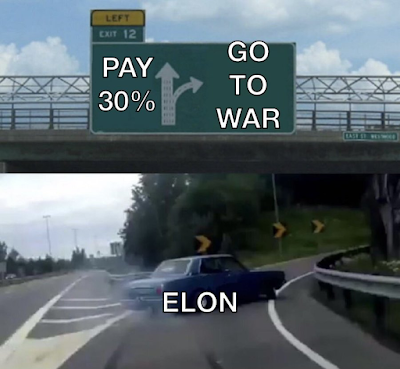The first final judgment (as opposed to a preliminary injunction ruling such as the one in Colombia) in the current multijurisdictional Ericsson-Apple patent dispute came down yesterday--and Apple lost an offensive case in Germany. Apart from design patent cases, it's the first judgment in an offensive technical (utility) patent case brought by Apple since the second case against Samsung that went to trial in San Jose in 2014.
As a spokeswoman for the court just informed me, the Second Civil Chamber (Presiding Judge: Dr. Holger Kircher) of the Landgericht Mannheim (Mannheim Regional Court) yesterday handed down a judgment in Ericsson's favor, rejecting Apple's patent infringement complaint and imposing all costs on the iPhone maker. Apple can appeal this decision to the Sixth Civil Senate (Presiding Judge: Andreas Voss ("Voß" in German)) of the Oberlandesgericht Karlsruhe (Karlsruhe Higher Regional Court).
The case no. is 2 O 9/22; the trial was held on October 18; and the patent-in-suit is EP2945332 on an "apparatus and methods for network resource allocation."
Ericsson was successfully defended by the Dusseldorf-based law firm of Kather Augenstein. I've found out now that Ericsson's lead counsel defending against this particular Apple lawsuit was Christopher Weber, who was supported by Dr. Christof Augenstein and Sophie Prudent.
The patent specification describes EP'332, which has not been declared essential to any cellular standard, as being "directed to a computer networking device (e.g., a router) which is adapted to allocate portions of a communications network or its available bandwidth between different uses." While the specification also says the claimed invention "relates generally to the field of data networks," it appears that Apple couldn't show that Ericsson's cellular (4G/5G) base stations infringe this patent that clearly has its roots in the WiFi space. That is obvious from the use of typical WiFi terminology such as "access point" in the claim language (emphases added):
A method for allocating a collective bandwidth of a plurality of wireless access points, the method comprising:
at a first wireless access point of the plurality of wireless access points
receiving a request for a first use from a wireless client device;
in response to the request for the first use, allocating a first portion of the collective bandwidth to the first use based at least in part on a bandwidth allocation rule that is dynamically set and that implements in part a bandwidth allocation of the collective bandwidth, wherein the bandwidth allocation rule is based on a level of network security associated with security requirements for different types of traffic;
allocating a second portion of the collective bandwidth to a second use different from the first use based at least in part on the bandwidth allocation rule; and
servicing the request for the first use using the first portion of the collective bandwidth,
wherein each of the plurality of wireless access points dynamically allocates one or more portions of the collective bandwidth to at least the first use or the second use based at least in part on one or more bandwidth allocation rules to maintain the bandwidth allocation of the collective bandwidth.
In theory, a patent stemming from WiFi research could cover such a foundational technique and be so broad that even cellular (4G/5G) base stations infringe it. But a patent holder would be lucky in that case, and Apple wasn't.
None of Ericsson's cases against Apple has come to judgment yet, but it's going to happen in the not too distant future. The Munich I Regional Court held two hearings (not yet full trials) in September and is inclined to find that the iOS version of WhatsApp (which Apple exclusively distributes due to its app distribution monopoly abuse) infringes an Ericsson non-standard-essential patent (non-SEP) as well as a standard-essential patent, with respect to which the Munich court denied Apple's motion to dismiss the complaint at this stage. Three weeks ago the Mannheim Regional Court heard an Ericsson v. Apple SEP case and appeared inclined to deem the patent infringed and likely valid. The FRAND part was discussed behind closed doors, but Apple would be the first defendant in a Mannheim or Munich SEP case in the post-Sisvel v. Haier era to be deemed a willing licensee.
A FRAND trial in the Eastern District of Texas will start on Monday, and it won't be easy for Apple to persuade the jury that the royalties it pays to Qualcomm should be ignored.
The United States International Trade Commission (USITC, or just ITC) will also hold an Apple v. Ericsson trial starting next week. Apple is seeking a U.S. import ban on Ericsson's base stations. Whether that would actually happen and (should it happen) make an impact is questionable. The ITC staff opposes an untailored import ban (while Apple even opposes telecommunications carriers's right to repair). Yesterday a public redacted version of an Ericsson filing with the ITC became available, and it states that "[t]he vast majority of the Accused [Ericsson] Products are manufactured and assembled in the United States from [REDACTED] of individually imported components." Apple's strategy is to "[rely] on indirect infringement allegations to demonstrate a violation through Ericsson’s imported components."
While the first Ericsson v. Apple injunction is just a matter of time, it looks like Apple can't easily find patents in its portfolio that can do damage to Ericsson's business. And Ericsson is a lot smaller than Apple anyway, especially in unit volumes, which means its exposure to patent assertions is dwarfed by Apple's.
The dispute is now entering a very interesting stage, and Apple has just suffered a setback in the form of the rejection of its Mannheim countersuit.

